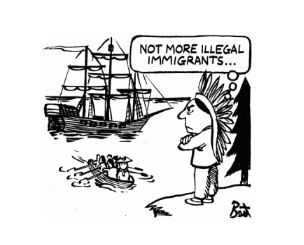Immigrants or Colonists?
A lot of debate and passion is offered every Thanksgiving season in the USA about whether the Pilgrims should be remembered in any kind of noble way. Didn’t they help lead the white European invasion of Native American culture and sovereignty? Or, were they persecuted refugees looking for a safer land where they could be free, like many immigrants in the world today?
This Thanksgiving lesson for English learners (usually immigrants themselves) includes the above cartoon’s humorous take on the Native American view of the Pilgrims’ arrival in the New World and echoes the debates of our modern headlines.
In this interview with the author of The Mayflower: the Families, the Voyage, and the Founding of America, Rebecca Fraser, says:
“As I was writing this book, the plight of refugees coming from the Middle East and Africa began to be very visible in Europe.
The parallel for me was that a lot of these people are like the Pilgrims – many had professional qualifications in their own countries.
Today’s refugees are surgeons and doctors and lawyers who have nothing to show their status in their home country. One of the most important Pilgrim leaders was an ex-diplomat who descended from a long line of members of Parliament, and many others came from wealthy families…
But the downside of Leiden was that the Pilgrims had to abandon their homes and work for Dutch cloth manufacturers who exploited them. Spending 12 hours at their looms was normal.
And like most refugees, they were living in pretty unpleasant circumstances because they had very little money.”
Fraser goes on to address the question of the Native Americans and the Pilgrims’ relationships with them:
“You can’t attribute the abuse of native peoples for centuries to the Pilgrims. The first generation of colonists were very respectful of their new neighbors and also very dependent on them.”
In this day and age, the best way to know is to listen to the voices of those who made the journey. We try to listen to the views of our countrymen, and to the views of refugees and immigrants. One way to hear the voice of the “Pilgrim Fathers” and their motives for coming to the New World is to read the arc of their story in One Candle’s Light: The Thanksgiving Story You Never Knew.

